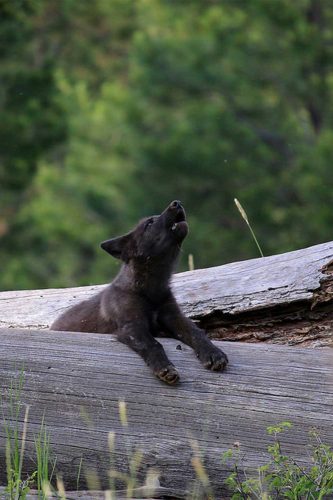
Cascadia Wildlands was born in 1998 out of the Pacific Northwest’s “Forest Wars.” And as it celebrates its 20th anniversary, the longtime nonprofit continues to fight to save the flora and fauna of the Northwest’s Cascadia bioregion. In December Cascadia Wildlands will also celebrate its successes with its annual Winter Wonderland fundraising auction.
The Warner Creek Blockade was seminal for many of Oregon’s forest activists. For 343 days, activists blocked a forest road about 40 minutes southeast of Eugene to prevent logging on a patch of old-growth forest that had been burned in an act of arson. The blockade was dismantled in 1996, but the forest defenders had succeeded, and the burned forest has been regenerating since then.
Josh Laughlin, executive director of Cascadia Wildlands, says after that, “The quasi-organization assumed the moniker of Cascadia Timber Monitoring Group when it was based out of the Survival Center in the Erb Memorial Union at the UO. It was there that we commandeered computers, fax machines, phone lines, photocopiers, rabble-rousers and other necessities to stop old-growth timber sales on nearby public forests.”
Laughlin, who had been the editor of Earth First! Journal, officially started as staff in 2001. “I was offered a corner in a shoebox of an office at the Growers Market,” he says, “and was told I could have a job if I raised some money because we didn’t have any. I quickly learned how to write grants and throw successful beer parties.”
Laughlin says the first Wonderland auction in 2003 raised $7,000. “I remember an attorney/board member auctioning off her services to help expunge criminal records.”
The event, which is already sold out for Dec. 1, has come a long way. “Last year the Wonderland Auction raised $90,000,” Laughlin says. “This year, we hope to reach $100,000, nearly a quarter of our annual operating budget.”
Cascadia Wildlands was the brainchild of Mick Garvin, now the proprietor of Deep Woods Distillery in Oakridge, not far from Warner Creek. He jokes, “I buttonholed James [Johnston] in our Glenwood front yard around a fire, suggesting we do something that would keep the riffraff constructively occupied.” Garvin and Johnston, like many of Cascadia Wildlands original board members and supporters, participated in the blockade. Johnston was the group’s first executive director.
Garvin explains the original official name was Cascadia Wildlands Project to “encompass the larger bioregion and expand beyond forest defense.” The word project was later dropped.
Sarah Peters is a current board member. She first volunteered with the group in 2003 as a law student and became a board member in 2010. She explains her long-term commitment, saying Cascadia Wildlands “drew a hard line when necessary in order to defend and protect this amazing bioregion, but still maintained good relationships with many of the government employees whose agency’s actions they were challenging.”
And, Peters adds, “I was also impressed with their ability to accomplish so much, with so little — they’ve always been scrappy, and that hasn’t changed.”
As for what Cascadia Wildlands has accomplished — and what it is still fighting for — Peters says, “We don’t hesitate to fight what is wrong for the ecological health of our bioregion — timber sales in old-growth forests or in habitat for sensitive species, ill-conceived natural gas pipelines, poorly sited off-road vehicle routes and roads, suction dredge mining in fish-bearing streams, and the lists go on.”
She says the group uses “all of the tools available to do it” including grassroots organizing and ground-truthing, submitting formal comments on agency projects and getting the public engaged as well as legal appeals. Litigation comes “when all else fails and our laws still need to be enforced by citizen action.”
Laughlin points to Cascadia Wildlands’ ongoing work on gray wolf recovery, whose numbers are climbing in Oregon, Washington and California, as well as efforts to preserve forests in the face of climate change. Former clearcuts “replanted with dense homogenous tree farms create more fire-prone landscape” he says, and create a “smokescreen” for logging for politicians like President Trump.
Staving off timber companies and the privatization of Oregon’s Elliott State Forest, Laughlin says, is one of the biggest conservation feats in decades. And, he warns, “It’s not a done deal.” The Elliott, a coastal rainforest, is home to threatened marbled murrelets, coho salmon, mountain beaver and spotted owls, among other species.
Although the Cascadia Wildlands Winter Wonderland Auction at 6 pm, Saturday, Dec. 1, is sold out at Venue 252, Laughlin says supporters are welcome to attend an after party with DjGroovemaker from 10 pm to 2 pm at Thinking Tree Spirits, 88 Jackson Street.